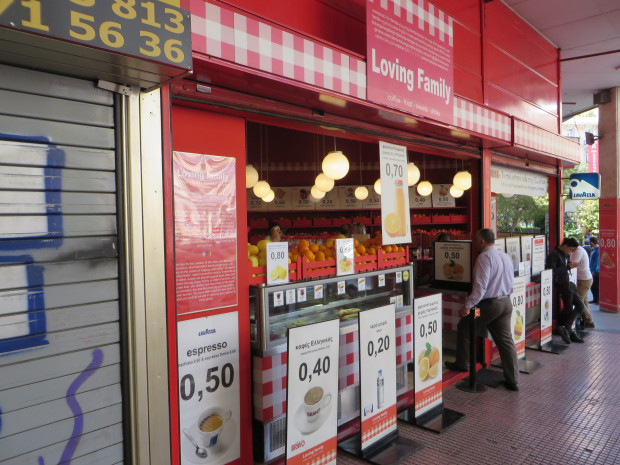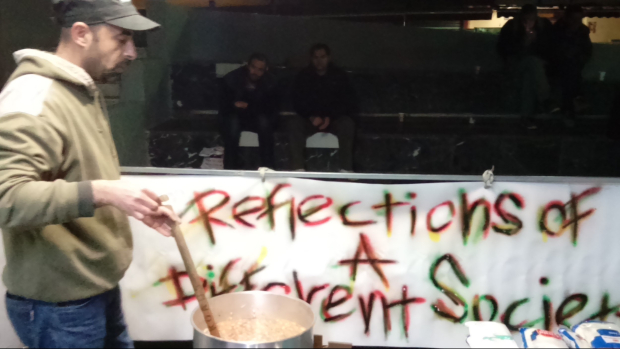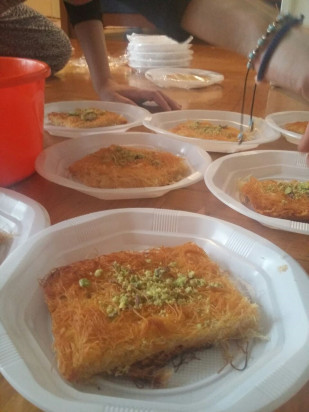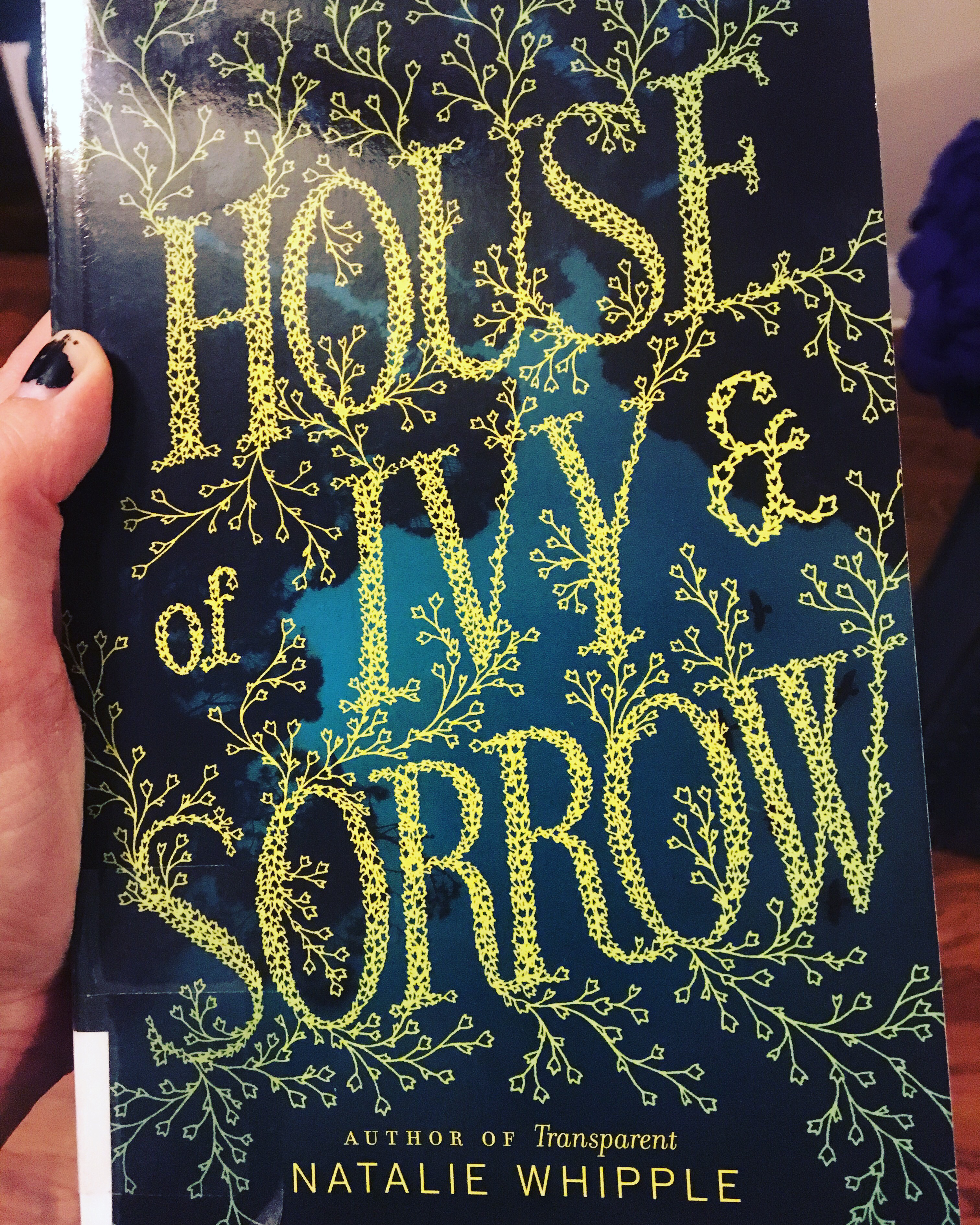In this piece, Tahir Zaman reflects on how new models of citizenship are up-ending the myopia of state-centric responses to displacement. In Athens, a ‘mobile commons’ is opening up, defined by sharing, solidarity and resistance to a state whose priorities reflect more the interests of international capital than the needs of both refugees and hosts alike. As Zaman suggests, the challenge of displacement, and the failure of state-centric responses to it, is mobilising diverse forms of hospitality (and hostility) toward refugees, often pioneered through the politics of solidarity: in particular, autonomous housing collectives. Our Refugee Hosts project aims to understand the motivations behind such responses – whether they are explicitly or implicitly inspired by faith, shared histories, or new forms of refugee-refugee solidarity – so that we can improve and enhance humanitarian engagements with local communities in Lebanon, Jordan and Turkey.
Athens and the Struggle for a Mobile Commons
By Tahir Zaman, SOAS, University of London
There is a haunting on the peripheries of Europe today. Carried by people on the move, memories, traces, and echoes of shared pathways and vernaculars are once again becoming seen and heard. Together with local residents, undocumented migrants, refugees and asylum-seekers in Athens are producing and inhabiting a mobile commons that challenges and seeks to up-end myopic state-centric understandings of citizenship.
This is a world characterised by sharing; be it information, sociability, or resources. Solidarity and mutual care are the principles on which the encounter with the other is organised. The experience of having a heightened austerity imposed upon them has led segments of the local Greek population to recognise in people on the move their own struggles against a state beholden to the dictates of a movement of a different kind – that of an un-anchored and unfettered international capital.
Nowhere is this more evident than on either side of the Patission thoroughfare in central Athens – in the Exarcheia neighbourhood, and around the vicinity of Acharnon street. Here, an autonomous collective housing movement has emerged providing much needed shelter to spontaneously self-settled Syrian, Iraqi, Kurdish, Palestinian and Afghan refugees. The juxtaposition of thousands of refugees and migrants homeless in the streets of Athens with an increasing number of abandoned and derelict hotels, apartments and office blocks in the heart of the city prompted civil society activists into action in the spring of 2016 – squatting a number of buildings. The explicit political objective of struggling together in solidarity of the autonomous collective housing movement brings with it the opportunity for the bridging of difference across class, ethnic, and religious boundaries.

A squatted building home to around 140 refugees and asylum seekers in Athens (c) T. Zaman
These transversal spaces of temporary refuge become the coalface at which a plurality of different actors converge. Solidarity activists, local and European volunteers some of whom arrive in an individual capacity, others from diaspora or faith community associations, find space alongside newly arrived refugees and asylum seekers to facilitate fleeting relations that can transform into more lasting friendships. This is in no small part due to longstanding traditions of hospitality shared amongst those who arrive and those already present – providing opportunities to mobilise a learned grammar of sociability.
A cooperatively operated cafe serving discounted food and beverages in Athens (c) T. Zaman

People on the move are giving back by volunteering at a soup kitchen for homeless people in Athens (c) T. Zaman
While this provides a framework for understanding civility in the encounter with the other it does little to acknowledge pre-existing spatial relations of linkage, and flow. Is it at all possible to knit together these multiple geographies? Places such as Exarcheia have long internalised histories as well as being constellations where a wide array of actors converge. The migration histories or trajectories that bring these diverse actors together in one place are important in understanding how the heterogeneity of such places is navigated. It reminds us that while difference may be negotiated through practices of conviviality, tensions arise concerning how and through whom resources are distributed.This is in no small part due to the contested understandings of solidarity – itself a nebulous concept laid claim to by a number of actors. Pro-migrant activists understand solidarity through progressive everyday acts that are in opposition to hierarchical dictates of humanitarian actors including the state. Faith-inspired volunteers speak of accompaniment and of standing as witnesses to the journeys undertaken by people on the move. Refugees and asylum seekers themselves describe their squatted residences as small villages where family and friends are entrusted with the mutual care of one another. Pro-migrant activists hailing from traditions of the political left, channelling the spirit of Oscar Wilde, rail against the multitude of sins concealed in humanitarian giving. Volunteers respond that at the very least something is done at this ‘time of crisis’. Both find meaning for the gift-giving and acts of solidarity in the lived encounter with the other.
On the other hand, some migrants and refugees are wary of paternalistic attitudes prevalent among elements of this ad-hoc care network, labelling them as ‘monopolists’. They insist that they too have skills and capacities that are not sufficiently being tapped into. One refugee I spoke to told me:
“We have teachers, engineers, doctors among us. We don’t need volunteers coming from Europe to come and hug our children – we can do that ourselves. We can make the children happy. We can show Europe another face of what it means to be a refugee – one which isn’t asking and in need but one that is giving and sharing with their new neighbours.”

Knafeh made by residents of a squat to distribute amongst neighbours in Athens (c) T. Zaman
Autonomous housing collectives open up space for people on the move to take up more transformative roles. Refugee and migrant residents of the squatted buildings take it upon themselves to maintain the upkeep of their residences and pool donated resources to provide three meals per day. Making use of social network platforms, the residents of the squats are able to plug into an existing network of solidarity initiatives, and secure food and non-food relief items. Regular assemblies are held at the squats to create consensus on what the priorities are for residents and to introduce initiatives from local activists and European volunteers. The latter act as an important vector for resources raised through crowd-funding and donations from abroad.
Residents of the squats support each other with acts of mutual care and solidarity (c) T. Zaman
Herein lies the dilemma at the heart of the autonomous housing collectives in Athens. While they are indeed central in shaping the mobile commons, they remain dependent on the gift of resources. Until the residents of the autonomous housing collectives are able to access and participate fully in the nascent social economy in Athens, the logic of hospitality, wherein refugees and asylum seekers are configured as guests, maintains an uncomfortable status quo.
The precarious situation of people on the move is complicated further in that such housing arrangements are not recognised as legitimate by state authorities. Indeed, the state presents the greatest threat to these nascent articulations of a mobile commons. While buildings have fallen into disrepair, the original owners continue to be billed for property tax and for use of utilities. This puts pressure on the state to enforce evictions and heed calls for the championing of organised hospitality structures under the aegis of recognised NGOs.
Such formalised approaches arguably lend themselves to the co-option of solidarity efforts by market-oriented actors and present a real risk to projects for the mobile commons.
*
If you have found Tahir’s piece of interest, read these two related articles on refugee-volunteer solidarity and refugees hosting refugees. For regular updates, subscribe to our blog by using the form on the top right of this website.
Featured Image: People on the move are giving back by volunteering at a soup kitchen for homeless people in Athens (c) T. Zaman
Share this:





